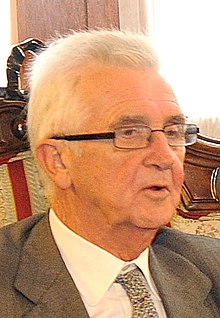Lord Garel-Jones
|
The Right Honourable The Lord Garel-Jones PC |
|
|---|---|
 |
|
| Minister for Europe | |
|
In office 14 July 1990 – 27 May 1993 |
|
| Prime Minister | John Major |
| Preceded by | Francis Maude |
| Succeeded by | David Heathcoat-Amory |
| Treasurer of the Household | |
|
In office 25 July 1989 – 14 July 1990 |
|
| Prime Minister | Margaret Thatcher |
| Preceded by | David Hunt |
| Succeeded by | Alastair Goodlad |
| Comptroller of the Household | |
|
In office 26 July 1988 – 25 July 1989 |
|
| Prime Minister | Margaret Thatcher |
| Preceded by | Robert Boscawen |
| Succeeded by | Alastair Goodlad |
| Vice-Chamberlain of the Household | |
|
In office 16 October 1986 – 26 July 1988 |
|
| Prime Minister | Margaret Thatcher |
| Preceded by | Robert Boscawen |
| Succeeded by | Michael Neubert |
| Member of Parliament for Watford |
|
|
In office 3 May 1979 – 1 May 1997 |
|
| Preceded by | Raphael Tuck |
| Succeeded by | Claire Ward |
| Personal details | |
| Born | 28 February 1941 |
| Nationality | British |
| Political party | Conservative |
William Armand Thomas Tristan Garel-Jones, Baron Garel-Jones, PC (born 28 February 1941) is a British politician. A member of the Conservative Party, he served as the Member of Parliament (MP) for Watford from 1979–97, before being made a life peer in 1997.
Following his election to Parliament, Garel-Jones served in various whip positions and also as a junior minister at the Foreign and Commonwealth Office.
Garel-Jones was educated at the King's School, Canterbury.
Garel-Jones first contested Caernarvon in February 1974, but was defeated by the future leader of Plaid Cymru Dafydd Wigley. He was elected for Watford at the 1979 General Election.
Viewed as an effective whip who successfully delivered parliamentary votes in favour of Thatcher's legislation, Garel-Jones was nonetheless seen as a mixture of Machiavelli and Ivan the Terrible by the Thatcherite right-wing.
Mr Garel-Jones is said to be the inspiration for the fictional Whip turned PM, Francis Urquhart in House of Cards.
Garel-Jones was a leading pro-European and remained so despite the Conservative party moving to a more eurosceptic position by the end of the Thatcher era. This created suspicion among right-wing Thatcherites who thought of him as one of the "wets". However, he voted for Margaret Thatcher in the first round of the leadership challenge by Michael Heseltine, but reserved the right to vote against her if it went to a second round. He subsequently voted for Douglas Hurd.
...
Wikipedia
